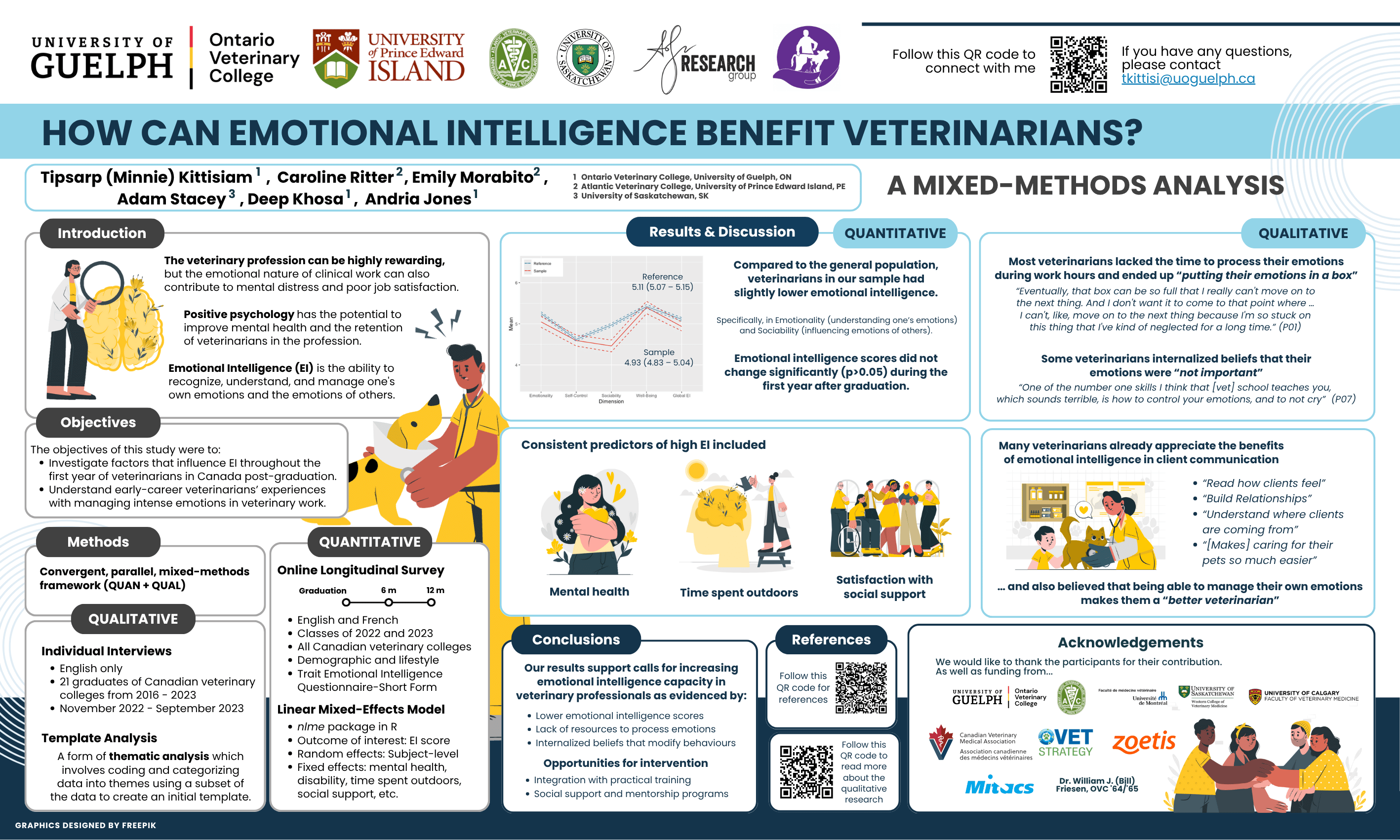How can Emotional Intelligence benefit veterinarians?
A Mixed-Methods Analysis
Note
This poster presents the combined results from chapters 3 & 4 of my doctoral thesis, Explorations of Emotional Intelligence and Thriving Well-being in Early-career Veterinarians.
Chapter 3 of my thesis has also been published as the article “A qualitative exploration of the emotional experiences and applications of emotional intelligence in early-career veterinarians”
Poster
Click on the image below to view the poster.
References
Bartram, D. J., Yadegarfar, G., & Baldwin, D. S. (2009). Psychosocial working conditions and work-related stressors among UK veterinary surgeons. Occup Med (Lond), 59(5), 334-341. https://doi.org/10.1093/occmed/kqp072
Brooks, J., McCluskey, S., Turley, E., & King, N. (2015). The Utility of Template Analysis in Qualitative Psychology Research. Qual Res Psychol, 12(2), 202-222. https://doi.org/10.1080/14780887.2014.955224
Cake, M. A., Bell, M. A., Williams, J. C., Brown, F. J., Dozier, M., Rhind, S. M., & Baillie, S. (2016). Which professional (non-technical) competencies are most important to the success of graduate veterinarians? A Best Evidence Medical Education (BEME) systematic review: BEME Guide No. 38. Med Teach, 38(6), 550-563. https://doi.org/10.3109/0142159X.2016.1173662
Creswell, J. W., & Poth, C. N. (2018). Qualitative inquiry & research design : choosing among five approaches (Fourth edition. ed.). SAGE Publications, Inc.
Gardner, D. H., & Hini, D. (2006). Work-related stress in the veterinary profession in New Zealand. N Z Vet J, 54(3), 119-124. https://doi.org/10.1080/00480169.2006.36623
Gilling, M. L., & Parkinson, T. J. (2009). The transition from veterinary student to practitioner: a “make or break” period. J Vet Med Educ, 36(2), 209-215. https://doi.org/10.3138/jvme.36.2.209
Hatch, P. H., Winefield, H. R., Christie, B. A., & Lievaart, J. J. (2011). Workplace stress, mental health, and burnout of veterinarians in Australia. Aust Vet J, 89(11), 460-468. https://doi.org/10.1111/j.1751-0813.2011.00833.x
Mastenbroek, N. J., van Beukelen, P., Demerouti, E., Scherpbier, A. J., & Jaarsma, A. D. (2015). Effects of a 1 year development programme for recently graduated veterinary professionals on personal and job resources: a combined quantitative and qualitative approach. BMC Vet Res, 11, 311. https://doi.org/10.1186/s12917-015-0627-y
McArthur, M. L., Learey, T. J., Jarden, A., Van Gelderen, I., Hazel, S. J., Cake, M. A., Mansfield, C. F., Zaki, S., & Matthew, S. M. (2021). Resilience of veterinarians at different career stages: The role of self-efficacy, coping strategies and personal resources for resilience in veterinary practice. Vet Rec, 189(12), e771. https://doi.org/10.1002/vetr.771
Perret, J. L., Best, C. O., Coe, J. B., Greer, A. L., Khosa, D. K., & Jones-Bitton, A. (2020). Prevalence of mental health outcomes among Canadian veterinarians. J Am Vet Med Assoc, 256(3), 365-375. https://doi.org/10.2460/javma.256.3.365
Petrides, K. V. (2009a). Psychometric Properties of the Trait Emotional Intelligence Questionnaire (TEIQue). In J. D. A. Parker, D. H. Saklofske, & C. Stough (Eds.), Assessing Emotional Intelligence (pp. 85-101). Springer US. https://doi.org/10.1007/978-0-387-88370-0_5
Petrides, K. V. (2009b). Technical manual for the Trait Emotional Intelligence Questionnaires. In (1st ed.). London: London Psychometric Laboratory.
Timmins, R. P. (2006). How does emotional intelligence fit into the paradigm of veterinary medical education? J Vet Med Educ, 33(1), 71-75. https://doi.org/10.3138/jvme.33.1.71
VanderWeele, T. J., Chen, Y., Long, K., Kim, E. S., Trudel-Fitzgerald, C., & Kubzansky, L. D. (2020). Positive Epidemiology? Epidemiology, 31(2), 189-193. https://doi.org/10.1097/EDE.0000000000001147
